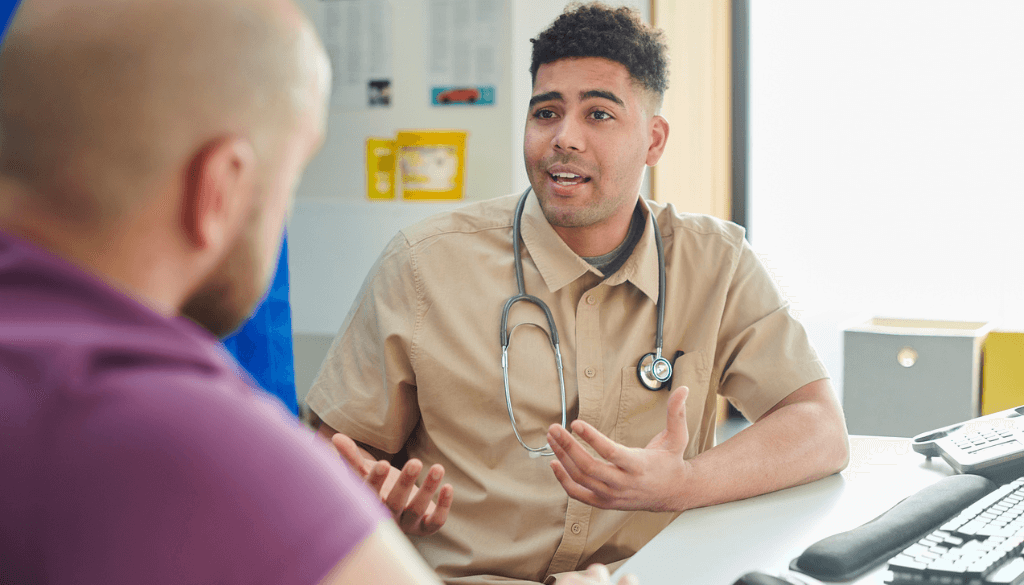Life after GP training
General Practitioners brings together physical, psychological, and social aspects of healthcare and a GP is most people’s first point of contact when seeking healthcare treatment. GPs operate in the communities in which they live, and they work with a wider multi-discipline team including practice nurses, midwives, health visitors, pharmacists, physiotherapists, and other specialists. GPs typically work out of a GP surgery to help promote health, prevent illnesses, and provide medical treatment and plans. GPs are the backbone of the NHS but they can face many challenges, and we are going to take an in depth look at the GP career path, from training right through to choosing your first GP role.
Back to the beginning – what GCSE’s and A-Levels do you need to become a GP?
Most medical universities in the UK have their own unique admissions criteria, so entry requirements will be different for each school. To apply, you will need a combination of GCSEs, AS levels and A levels, and most universities will seek students who have strong grades in subjects such as science and maths. You can also help your application by securing a spot in some healthcare related work experience. In general, to help increase your chances of being accepted onto a medical degree you should aim for:
- 7 GCSEs including science, with at least 5 subject grades 9-7 (A* / A) and English and Maths at least grade 5 -6 (B)
- 3 A Levels at grade A in chemistry and either biology, physics, or maths, plus one other academic subject
How to become a GP in the UK
Once you have been accepted onto your medical degree, there are a few more steps that you will need to take in order to become a fully qualified GP
- Complete your degree – this is an obvious one, but if you are looking to become a GP in the UK then you will need to finish a medical degree that is recognised by the General Medical Council. This usually takes 5 years studying as an Undergraduate, although if you already hold a BSc degree you could start a year later. Depending on which course you choose to take, you will qualify with an MB (Bachelor of Medicine) or with an MBBS ( (Bachelor of Medicine, Bachelor of Surgery)
- Undergo foundation training – Once you have completed your degree, you will then need to complete the Foundation Programme. This is a 2-year programme that allows you to try out different specialities (all complete supervised)
- Complete your GP Specialist training – Once Foundation Training is complete, you will then need to undertake specialist training in general practice. You will spend 18-24 months working as a specialist registrar in a hospital. This will allow you to gain experience in a wide range of jobs whilst in the hospital setting, including general medicine, paediatrics, elderly care medicine, psychiatry, ENT accident and emergency, obstetrics and gynaecology, dermatology, ophthalmology, and palliative care.
- GP Speciality Registrar – You will then have to work for 12-18 months as a GP Speciality Registrar in General practice, where you will receive personal tuition from a seasoned GP. To successfully complete your training, you will need to gain a CCT (certificate of completion of training), whilst doing workplace-based assessment throughout.
- Register with the GMC – To work as a GP in the UK, you will need to hold a licence to practice medicine from the General Medical Council (GMC).
- Apply to become a member of the Royal College of General Practitioners – You will also need to gain a membership to the Royal College of General Practitioners. IN order to become a member of the RCGP, you will need to pass 3 exams – Applied knowledge test, clinical skills assessment, workplace-based assessment.
- Continuous Professional Development – Like all medical professionals, GPs should keep their training up to date long after their initial training has finished. The RCGP states that 250 credits are required for GP revalidation every 5 years, and GPS build up these credits by attending courses and conferences, and by doing e-learning through the RCGP
Life after training
Overall, it can take between 9-11 years to fully train as a GP in the UK, but the length of training will vary from person to person. Once it has been completed, there are several different career routes that you can choose to take. For some people, these options will offer higher pay or better working opportunities, whilst other options offer flexibility, and some are excellent for building a career.
Salaried GP
As a salaried GP, you will be employed by the general practice. This option will not feel so different from GP training, and you will have a clearly defined role. A salaried GP will give you a fixed timetable and a fixed income. As an employee of the general practice, you will have certain rights and benefits, including sick pay, holiday pay and maternity/ paternity pay, and you will not have to worry about tax, NI, or pension contributions as this will all be taken care of. You will generally work 37.5 hours (or 9 sessions) a week, but you will get less of a say as to how the practice is run. This is a good path for people who want a solid and stable career path.
GP Partners
As a GP partner, you will have a stable career path and help to run the practice with other team members. It can prove to be very lucrative to become a GP partner as you must take up more responsibility and step in if the need arises. You and your team will essentially run a private health practice, but you must ‘buy in’ to have this role. As well as clinical work, you will be responsible for the business as a whole, including management, staff, the building and ensuring that the practice meets all the legal requirements. As a GP partner, you will have a more flexible role than a salaried GP as you are only required to do a minimum of 2 clinical sessions per week, but you will have to take on other responsibilities such as CCG and PCN meetings (the bodies that govern primary care).
Freelance Sessional GP
This option offers you the most control over where you work and can also be potentially extremely lucrative. You will be self employed if you choose GP work, and you will be responsible for your own tax, NI, and pension contributions (which can put a lot of people off). You can choose to arrange the clinical sessions yourself with a local practice, join a chambers, use an introduction service or work through a GP medical services. Choosing this option means that you can pick and choose the days that you want to work, and you will have no binding contracts keeping you somewhere.
Portfolio GP
A Portfolio GP is the term used for GPs who have multiple roles within their working week – for example you have a primary job as a partner but you will have additional jobs in your portfolio. These additional jobs could include both clinical and non-clinical roles, and they can earn you a significant salary. This option provides a refreshing break for many, and the experiences in each role can help you perform better overall.
GP with Extended Roles (GPwER)
GP with Extended Roles (GPwER)
Life after GP training can be extremely rewarding and offers a lot of choice and flexibility for it to work how you want to. Depending on your choices, you can earn significantly more pay and have more flexibility than you could ever dream of when training to become a GP. If you plan properly and choose what really interests you, you can build a long and lasting career – and remember, it is not ‘one size fits all’. None of these options are the best option, and you need to experience a few to find out what will work for you.




